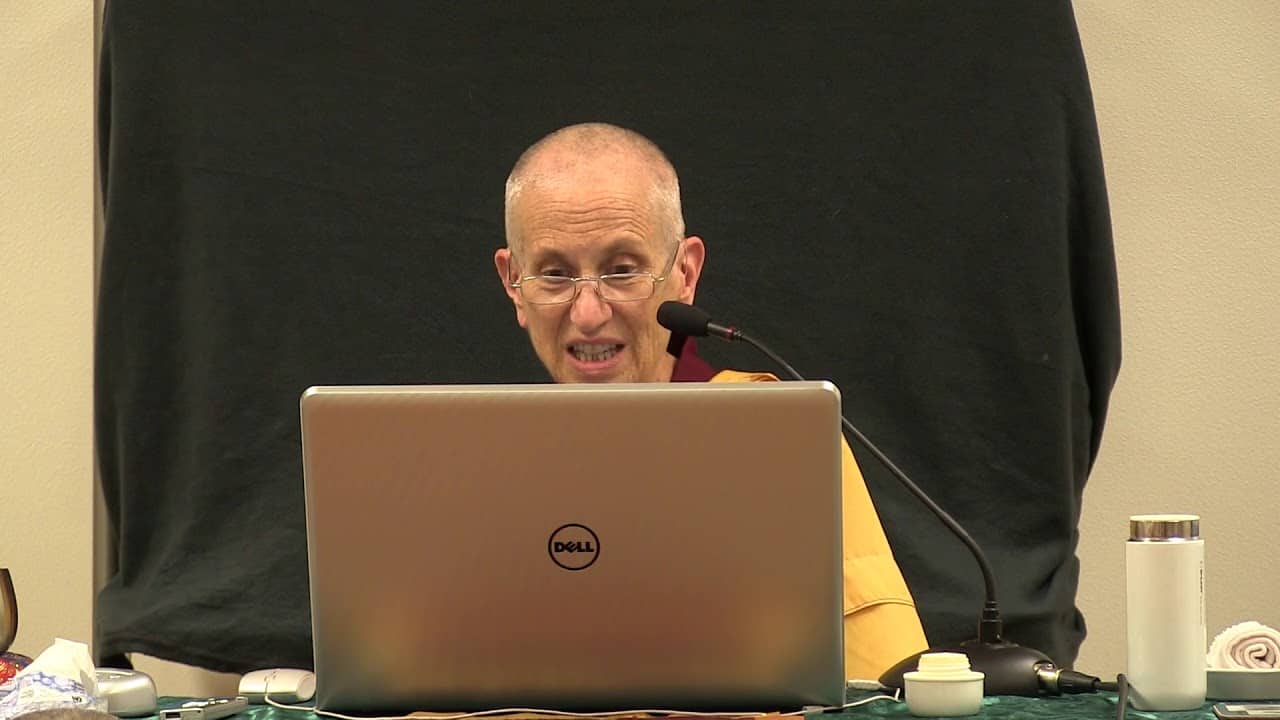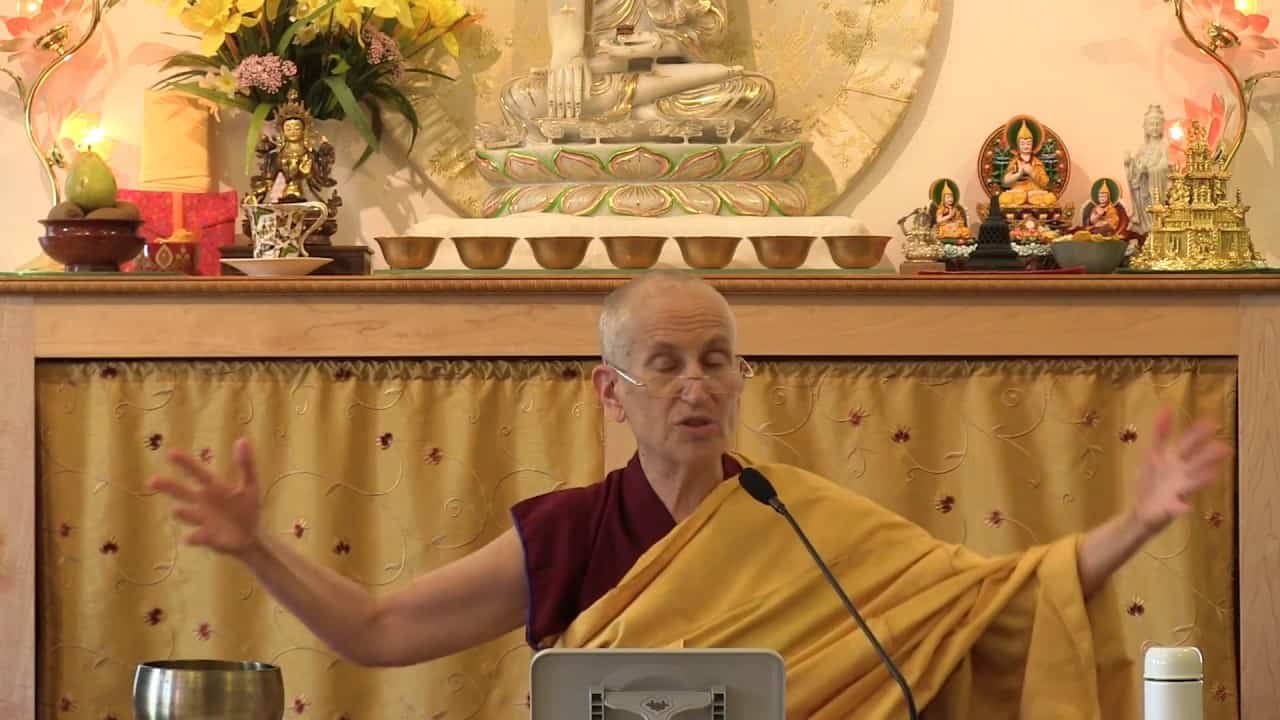Who are you judging?
Who are you judging?
Part of a series of short Bodhisattva’s Breakfast Corner talks on Langri Tangpa’s Eight Verses of Thought Transformation.
- How to see people as wish-fulfilling jewels
- Working on our anger
- Working with the judgmental mind
We’re still on verse 1:
With the thought of attaining enlightenment
For the welfare of all beings,
Who are more precious than a wish-fulfilling jewel,
I will constantly practice holding them dear.
I think we have to really practice seeing other people as wish-fulfilling jewels. To do that we have to do something about our anger, because our anger is a really big obstacle to seeing people as wish-fulfilling jewels. We usually see them as anti-wish-fulfilling idiots. So, something with our anger.
Our anger is related to our judgmental mind. Isn’t it? We look at people, we evaluate them according to our criteria, and we judge them. Then anybody that we have a negative impression of, the mind goes to aversion. We may not get manifestly angry at them initially, but the anger is right there because we’ve made a judgment. And the anger is going to come up like that [finger snap] because all they have to do is say “hello,” and they said “hello” the wrong way.
You know people like that, who say “hello” the wrong way?
When we’re in a bad mood we will find somebody to get mad at. And really, all they have to do is say hello. Sometimes they don’t have to say hello. They just walk in the room.
It’s very interesting to observe when this happens. The other person hasn’t said or done anything. So where is all this emotion on our part coming from? Whether it’s suspicion, aggression, fear, where is all of this coming from? Especially in situations where the person really, they haven’t done anything. Some situations…. I mean, they put the spatula in the wrong place. But why do I have to go into a rage over where somebody put the spatula? When that happens, it really has nothing to do with the other person, and everything to do with the state of my mind. Why is something so small like that becoming so significant in my mind? As if it’s a life and death issue.
I find that coming up sometimes in meetings. Especially long ones. I’m not a fan of meetings. I think all of you know that. Especially long meetings. When people say things ten gazillion times instead of getting to the point. And then somebody says some idea that I don’t agree with and it’s like I stop yawning and I sit up, and I’ve got to jump in and interrupt right now. Otherwise, this idea is going to take over the world, which will then crash.
It’s amazing. Do you have situations like that? Where it comes so strongly and you have to intercede right then and there. And it’s like…but why? It’s so interesting to stop at that moment. Why am I having such a strong reaction to this? They just said some words. That I disagree with. But lots of times if I just ignore those words in the meeting, nobody else adopts them. The person says them, and it’s forgotten. Sometimes maybe somebody will come back to it, then maybe I need to chime in. But if at the very beginning I interrupt and I say something, I’m actually drawing people’s attention to that issue, which is something they may have forgotten.
Are you getting what I mean?
It’s kind of like every time Trump says there’s no collusion, what do we think? There’s collusion. Otherwise, why is this guy talking so much about no collusion? If there were no collusion he would go testify and he would stop all this defending himself.
It’s the same thing. If somebody says some idea that I don’t agree with, if I immediately jump in and I have to put them in their place, otherwise this idea is going to be scorched-earth policy, I’m drawing more attention to it. And then, of course, how I express my idea isn’t so smooth, and it’s in a certain tone of voice, so then the other people in the meeting don’t listen to the words I’m saying, they only hear the tone of voice. And that tone of voice [thumbs down].
It’s interesting, also in our own experience, just sea when we use a certain tone of voice how people react, but how we react sometimes to people’s voice and forget about the content of what they’re saying. Just reacting to the voice, how they’re saying it. It could be “please pass the catsup.” Or (different tone of voice) “Please. Pass the catsup.”
These are all things when we notice our mind going in that direction to stop and (think), “Why is this such a big deal for me?” Especially when other people aren’t reacting to it at all. Sometimes there are reasons for it. For example, here in the monastery, part of my job is to oversee certain things that nobody else pays attention to. Or that people may pay attention to but nobody is going to comment on. So I’m the one who has to comment on them. So sometimes it’s appropriate to jump in and say things. But sometimes not.
The thing to watch, for is the anger and the judgment, because that is coming from us. I like this, I don’t like that. Becomes “this is good, this is bad.” Instead of even keeping it on a level of personal preference, we give it moral value. Which is ridiculous. Burned bread is bad. It’s unethical. [laughter] You broke your precepts if you burned the bread. This kind of thing, to be quite careful of, and to watch that anger come in our mind. And what is behind it? Is our usual way of relating to people one in which we automatically presuppose threat? Or is our way of relating to people one which is automatically loving kindness? As we were saying when we went through the four immeasurables. The usual way to approach people, metta, loving kindness, friendliness. But some of us? That’s not our usual way of approaching people when we meet people. The first thing is, “What are they going to do to me? Are they going to threaten me? Do they think they’re better than me? Are they going to put me down? Are they going to shame me? Are they this? Are they that?” All of that is coming from us. Very interesting to watch and see what we bring to a situation that contributes to our anger.
Especially in this day and age of identity politics, where what you bring to an encounter with somebody is all your identities. Somebody’s got to use the right pronoun when they talk to you, they can’t do anything about your culture, say anything about that that’s cultural appropriation, that’s bad. They can’t do this, they can’t do that. And we come with all these rules, ready to get angry if somebody doesn’t follow our rules, which we assume that the whole world must know.
It creates some problems. Doesn’t it? It becomes so difficult to see all sentient beings as wish-fulfilling gems if our habitual mind is suspicious and has a whole checklist of things that this person must do for us to consider them worthwhile. Or must not do, or else.
Let’s be aware of this kind of thing when it happens in us. And check. His Holiness always says the best laboratory is the one in here [ourselves]. This is our research laboratory. It isn’t always “why don’t these people understand me?” It’s “why am i judging other people?” Flip the question.
Venerable Thubten Chodron
Venerable Chodron emphasizes the practical application of Buddha’s teachings in our daily lives and is especially skilled at explaining them in ways easily understood and practiced by Westerners. She is well known for her warm, humorous, and lucid teachings. She was ordained as a Buddhist nun in 1977 by Kyabje Ling Rinpoche in Dharamsala, India, and in 1986 she received bhikshuni (full) ordination in Taiwan. Read her full bio.


